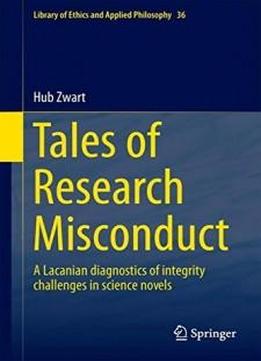
Tales Of Research Misconduct: A Lacanian Diagnostics Of Integrity Challenges In Science Novels (library Of Ethics And Applied Philosophy)
by Hub Zwart /
2017 / English / PDF
2.5 MB Download
This monograph contributes to the scientific misconduct debate
from an oblique perspective, by analysing seven novels
devoted to this issue, namely:
This monograph contributes to the scientific misconduct debate
from an oblique perspective, by analysing seven novels
devoted to this issue, namely:Arrowsmith
Arrowsmith by Sinclair
Lewis (1925),
by Sinclair
Lewis (1925),The affair
The affair by C.P. Snow (1960),
by C.P. Snow (1960),Cantor’s
Dilemma
Cantor’s
Dilemma by Carl Djerassi (1989),
by Carl Djerassi (1989),Perlmann’s Silence
Perlmann’s Silence by
Pascal Mercier (1995),
by
Pascal Mercier (1995),Intuition
Intuition by Allegra Goodman
(2006),
by Allegra Goodman
(2006),Solar
Solar by Ian McEwan (2010) and
by Ian McEwan (2010) andDerailment
Derailment by Diederik Stapel (2012). Scientific
misconduct, i.e. fabrication, falsification, plagiarism, but also
other questionable research practices, have become a focus
of concern for academic communities worldwide, but also for
managers, funders and publishers of research. The aforementioned
novels offer intriguing windows into integrity challenges
emerging in contemporary research practices. They are analysed
from a continental philosophical perspective, providing a
stage where various voices, positions and modes of discourse are
mutually exposed to one another, so that they critically address
and question one another. They force us to start from the
admission that we do not really know what misconduct is.
Subsequently, by providing case histories of misconduct, they
address integrity challenges not only in terms of individual
deviance but also in terms of systemic crisis, due to current
transformations in the ways in which knowledge is produced.
Rather than functioning as moral vignettes, the author argues
that misconduct novels challenge us to reconsider some of the
basic conceptual building blocks of integrity discourse.
by Diederik Stapel (2012). Scientific
misconduct, i.e. fabrication, falsification, plagiarism, but also
other questionable research practices, have become a focus
of concern for academic communities worldwide, but also for
managers, funders and publishers of research. The aforementioned
novels offer intriguing windows into integrity challenges
emerging in contemporary research practices. They are analysed
from a continental philosophical perspective, providing a
stage where various voices, positions and modes of discourse are
mutually exposed to one another, so that they critically address
and question one another. They force us to start from the
admission that we do not really know what misconduct is.
Subsequently, by providing case histories of misconduct, they
address integrity challenges not only in terms of individual
deviance but also in terms of systemic crisis, due to current
transformations in the ways in which knowledge is produced.
Rather than functioning as moral vignettes, the author argues
that misconduct novels challenge us to reconsider some of the
basic conceptual building blocks of integrity discourse.
Except where otherwise noted, this book is licensed under a
Creative Commons Attribution 4.0 International License. To view a
copy of this license, visit
http://creativecommons.org/licenses/by/4.0/.
Except where otherwise noted, this book is licensed under a
Creative Commons Attribution 4.0 International License. To view a
copy of this license, visit
http://creativecommons.org/licenses/by/4.0/.











